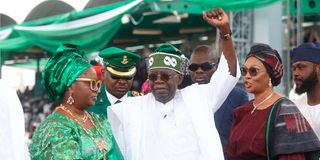
Bola Tinubu during his inauguration as Nigeria’s president in Abuja on May 29. Critics say he is not committed to improving university education funding.
Nigeria had prepared for ‘10 days of rage’ as youths poured into the streets across the country on August 1 to demand end to bad governance.
But by the fifth day, the protests had mostly fizzled out, victim of a counter movement that chose to loot and destroy. Either way, both groups helped end the Government’s nightmare on how to deal with the protests that were mimicking Kenya’s Gen Zs.
These youths were demanding the reversal of the removal of fuel subsidy, restoration of the regulated foreign exchange, reversal of electricity tariff hike, restructuring of the electoral and judicial systems as well as reduction in prices of fuel and food among others.
These changes had marked the first year of President Bola Tinubu’s government. He had argued that the fuel subsidies profited the rich importers and he had argued the exchange rate was falling victim to the black market, roiling the local Naira currency.
But the pain of enduring those changes became unbearable. When protesters poured into the streets, critics accused the police of heavy-handedness.
Nobel laureate, Prof Wole Soyinka, said his friend, Tinubu, failed to address the brutal crackdown of #EndBadGovernance protesters by security agencies.
In a statement, Soyinka also criticised the remedies announced by the government.
“My primary concern, quite predictably, is the continuing deterioration of the state’s seizure of protest management, an area in which the presidential address fell conspicuously short. “The nation’s security agencies cannot pretend unawareness of alternative models for emulation, civilised advances in security intervention,” Soyinka argued.
The police said seven people died, most of them, victims of a suicide bombing and car accident. But the protests were also helped by a surge of looting, mugging and other opportunistic crimes that formed a parallel, if not opposed, group of protests.
Some 681 people suspected to have broken into shops or destroyed critical infrastructure, were arrested in the melee, Mr Muyiwa Adejobi Nigerian, the Force Public Relations Officer said.
“The ongoing protest has obviously turned violent. We therefore advise law abiding citizens taking part in the protest across the country to immediately withdraw from it,” he said.
The protests were mainly hunger driven, and manifested in the demands fronted by peaceful demonstrators, and the looting where some people were seen walking away with stolen food items.
The northern states of Kano, Kaduna, Gombe, Borno and Jigawa had to impose a 24-hour curfew to deal with the menacing hoodlums.
The ensuing riots forced one of the supporters and social media influencer, Mr Martin Oste popularly known as ‘VeryDarkMan’ to call for the immediate suspension.
In series of videos he posted on his X handle, Verydarkman expressed worries over the menace of criminal interference and criticised the flowing of foreign flags and chanting for return of the military.
Nigeria experienced a series of successive coups for nearly 40 years until 1999 when Olusegun Obasanjo became President through elections. Obasanjo himself had in the past led a military government. But the country has since seen successive peaceful changes of government at the ballot box.
In Southern states such as Lagos, police seemed to have built a collaboration with peaceful protesters, to weed criminal elements. This was different from October 2020 when criminals interfered with #EndSars protests that had demanded end to police brutality.
Oyiga Micheal, a social media user under the name @Nsukka_okpa said on X: “I’ve been going out since the first day of the protest and let me say this; Today makes it Day 5, and we are reducing by numbers daily.
“Several groups are trying to lay claim on who started the movement. The momentum in the North will not slow down anytime soon; Lagos state police have managed the situation perfectly so far.’’
Victor Abiola also praised the police in Ibadan for not clobbering protesters.
“They guided us, followed us all the way from Iwo road and didn’t harass us or acted unprofessionally,” he wrote on X as @victor_abiolaa.
The Civil Society Legislative Advocacy Centre (CISLAC) had called for the protection of protesters amid growing concerns that the demonstrations have been hijacked by criminal elements and political actors with nefarious intentions.
In a statement on Friday in Abuja, Auwal Rafsanjani, Executive Director of CISLAC, condemned the hijack of the peaceful protest in some places and called for the protection of protesters and urged them not to destroy properties and public infrastructure and expressed deep concern over the deteriorating security situation and the influence of non-state actors in several states, including Kano.
“Criminal elements are exploiting the protests to create further unrest and undermine public safety,” he said.
When protests heated up, President Bola Tinubu issued a televised statement, agreeing that his subsidy removal had hurt many poor folks, but he argued there had been gains which would eventually be felt.
According to the National Bureau of Statistics (NBS), inflation had risen to 34.5 percent while food inflation rose to 40.9 percent, just as youth unemployment hit 34 million. More foreign companies are relocating due to high cost of production.
But President Tinubu said the policies had freed up some money, helping the country raise some N9.1 trillion ($6.8 billion); increased productivity in non-oil sector; reduced revenue to debt service by 68 percent from 97 percent; and cleared $5 billion forex backlog.
The president said government he had introduced measure to ease the burden of Nigeria through students’ loans, consumer credit schemes as well as skill-up digital programmes for more than 30,000 youths. He said he had also waived some duties on imported essential goods.
That didn’t sooth protesters initially, until goons came. Yet even after they withdrew from the streets, the pain of the economic costs was still bare.
“The youths cannot continue to wait for policies to mature because the government has continued to shift the goal posts of prosperity and perpetually pleading for patience and understanding,” argued Prof Alimi Jato, a right activist said.
“What is needed now is practical demonstration of activation of palliatives, including employment opportunities, reduction in prices of foodstuff and transportation cost, as well as reduction in cost of governance.’’







